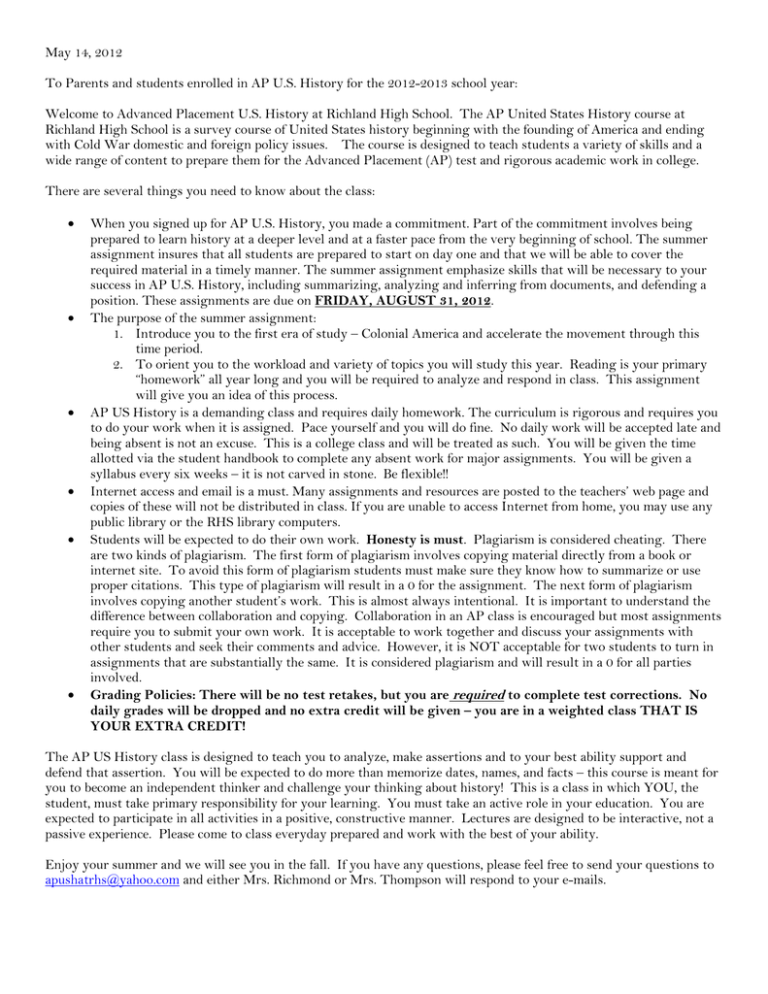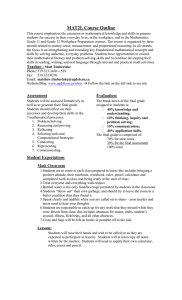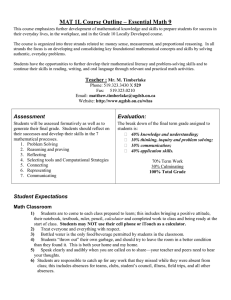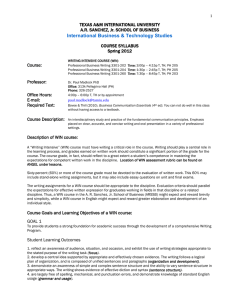May 14, 2012 To Parents and students enrolled in AP U.S. History
advertisement

May 14, 2012 To Parents and students enrolled in AP U.S. History for the 2012-2013 school year: Welcome to Advanced Placement U.S. History at Richland High School. The AP United States History course at Richland High School is a survey course of United States history beginning with the founding of America and ending with Cold War domestic and foreign policy issues. The course is designed to teach students a variety of skills and a wide range of content to prepare them for the Advanced Placement (AP) test and rigorous academic work in college. There are several things you need to know about the class: When you signed up for AP U.S. History, you made a commitment. Part of the commitment involves being prepared to learn history at a deeper level and at a faster pace from the very beginning of school. The summer assignment insures that all students are prepared to start on day one and that we will be able to cover the required material in a timely manner. The summer assignment emphasize skills that will be necessary to your success in AP U.S. History, including summarizing, analyzing and inferring from documents, and defending a position. These assignments are due on FRIDAY, AUGUST 31, 2012. The purpose of the summer assignment: 1. Introduce you to the first era of study – Colonial America and accelerate the movement through this time period. 2. To orient you to the workload and variety of topics you will study this year. Reading is your primary “homework” all year long and you will be required to analyze and respond in class. This assignment will give you an idea of this process. AP US History is a demanding class and requires daily homework. The curriculum is rigorous and requires you to do your work when it is assigned. Pace yourself and you will do fine. No daily work will be accepted late and being absent is not an excuse. This is a college class and will be treated as such. You will be given the time allotted via the student handbook to complete any absent work for major assignments. You will be given a syllabus every six weeks – it is not carved in stone. Be flexible!! Internet access and email is a must. Many assignments and resources are posted to the teachers’ web page and copies of these will not be distributed in class. If you are unable to access Internet from home, you may use any public library or the RHS library computers. Students will be expected to do their own work. Honesty is must. Plagiarism is considered cheating. There are two kinds of plagiarism. The first form of plagiarism involves copying material directly from a book or internet site. To avoid this form of plagiarism students must make sure they know how to summarize or use proper citations. This type of plagiarism will result in a 0 for the assignment. The next form of plagiarism involves copying another student’s work. This is almost always intentional. It is important to understand the difference between collaboration and copying. Collaboration in an AP class is encouraged but most assignments require you to submit your own work. It is acceptable to work together and discuss your assignments with other students and seek their comments and advice. However, it is NOT acceptable for two students to turn in assignments that are substantially the same. It is considered plagiarism and will result in a 0 for all parties involved. Grading Policies: There will be no test retakes, but you are required to complete test corrections. No daily grades will be dropped and no extra credit will be given – you are in a weighted class THAT IS YOUR EXTRA CREDIT! The AP US History class is designed to teach you to analyze, make assertions and to your best ability support and defend that assertion. You will be expected to do more than memorize dates, names, and facts – this course is meant for you to become an independent thinker and challenge your thinking about history! This is a class in which YOU, the student, must take primary responsibility for your learning. You must take an active role in your education. You are expected to participate in all activities in a positive, constructive manner. Lectures are designed to be interactive, not a passive experience. Please come to class everyday prepared and work with the best of your ability. Enjoy your summer and we will see you in the fall. If you have any questions, please feel free to send your questions to apushatrhs@yahoo.com and either Mrs. Richmond or Mrs. Thompson will respond to your e-mails. Assignment One: 2 daily grades Define the following terms/concepts/events/people and describe the significance of each on note cards. The terms should be categorized into 4 groups : people, social, political, and economic. Place the notecards on a ring and distinguish the categories – either use colored note cards or color the edges of cards. Students should be able to clearly define the terms in one or more sentences and be able to answer questions on the “who, what, when, and where” about these terms. Example: Lusitania – was a British passenger liner which was sunk by the Germans off the coast of Ireland in 1915. Students should also be able to state the “how and why” about the term which makes it significant in US History. Example: A number of Americans lost their lives when the Lusitania was sunk, which increased American antagonism toward Germany and German submarine warfare and ultimately contributed to the American decision for war against the Central Powers. Terms: 1. “inner light” 2. “starving time” 3. “stinking weed” 4. American Enlightenment 5. Anne Hutchinson 6. Bacon’s Rebellion 7. Captain John Smith 8. Charter Colonies 9. Congregationalism 10. Deism 11. Dominion of New England 12. Fundamental Orders of Connecticut 13. George Whitfield 14. Great Awakening 15. Great Migration 16. Half-way covenant 17. Harvard 18. Headright System 19. House of Burgesses 20. Indentured servants 21. Jamestown, 1607 22. John Rolfe 23. John Winthrop 24. Joint Stock Company 25. Jonathon Edwards 26. Lord Baltimore 27. Maryland Toleration Act 28. Massachusetts Bay Colony 29. Mayflower Compact 30. Mercantilism 31. Middle Passage 32. Nathaniel Bacon 33. Navigation Acts 34. Pennsylvania 35. Pilgrims 36. pluralism 37. Predestination 38. Primogeniture 39. Proprietary colonies 40. Puritans 41. Quakers 42. Roger Williams 43. Royal Colonies 44. Salem Witch Trials 45. Salutary neglect 46. Separatists 47. Stono Rebellion 48. Thomas Hooker 49. Triangular Trade 50. Visible Saints 51. William Berkeley 52. William Bradford 53. William Penn Assignment Two : Test Grade You will develop one-pagers to demonstrate your understanding of historical terms. You will complete a minimum of FIVE and maximum of TEN of these. You must use all of the terms listed above on the list. What is a ONE-PAGER? One-pager: A single-page that involves historical terms, your personal response, information and images. These one-pagers offer a way to make your own pattern of unique understanding by being creative and experimental. Requirements: - Use unlined white paper - Be informative, but concise - Select theme and/or quotations dealing with the historical terms o Use these as a springboard to explore your own ideas - Use a visual image or images, either drawn or cut out from magazines, to create a central focus for your page - Cluster around this image(s) impressions, feelings, or thoughts regarding what you have read or researched - Create the one-pager in such a way that your audience will understand something of your thinking about what you have read or researched - Feel free to use colored pencils, pens, crayons, markers, etc. - Include at least FOUR terms on each page - Create connections between terms on each page - Cite sources for written information as well any photos or pictures used on one pagers Resources: Hippocampus.org (videos about US history – find the AP US History tab and the topic) U-S-History.com Apstudent.com Schmoop. com Sparknotes.com





